Health Ethics Essay: Assisted Dying and Terminally Ill Patients
VerifiedAdded on 2022/10/15
|7
|1701
|12
Essay
AI Summary
This essay delves into the complex ethical considerations surrounding assisted dying, focusing on the role of physicians and the rights of terminally ill patients. It examines the ethical dilemma physicians face when balancing their duty to preserve life with the potential for assisting in a patient's death. The essay provides an overview of the legal landscape, particularly in Canada, where assisted dying is legal, and discusses the importance of palliative care. It explores the perspectives of patients, healthcare professionals, and family members, highlighting the significance of quality of life and patient autonomy. The essay concludes by emphasizing the ethical significance of allowing terminally ill patients to choose assisted dying under specific limitations, while also acknowledging the ongoing need for compassionate care. The paper references various sources to support its arguments, including legal cases, academic journals, and research studies. The essay argues that assisted dying is an ethical option for terminally ill patients who are suffering and have no other options, and that it is crucial to consider both the legal and ethical facets of this practice.

Health Ethics
1
Health Ethics
Student Name
1
Health Ethics
Student Name
Paraphrase This Document
Need a fresh take? Get an instant paraphrase of this document with our AI Paraphraser
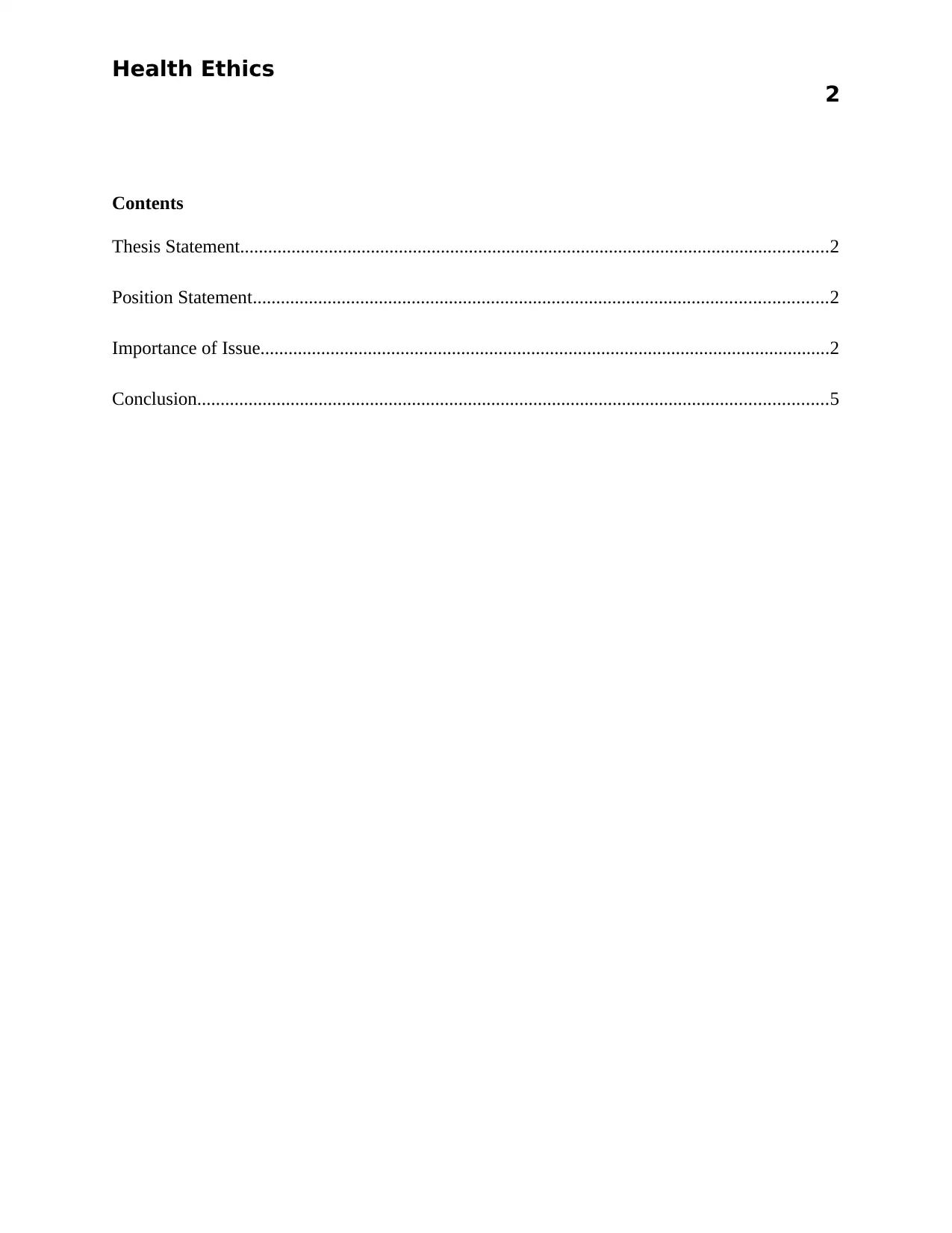
Health Ethics
2
Contents
Thesis Statement..............................................................................................................................2
Position Statement...........................................................................................................................2
Importance of Issue..........................................................................................................................2
Conclusion.......................................................................................................................................5
2
Contents
Thesis Statement..............................................................................................................................2
Position Statement...........................................................................................................................2
Importance of Issue..........................................................................................................................2
Conclusion.......................................................................................................................................5
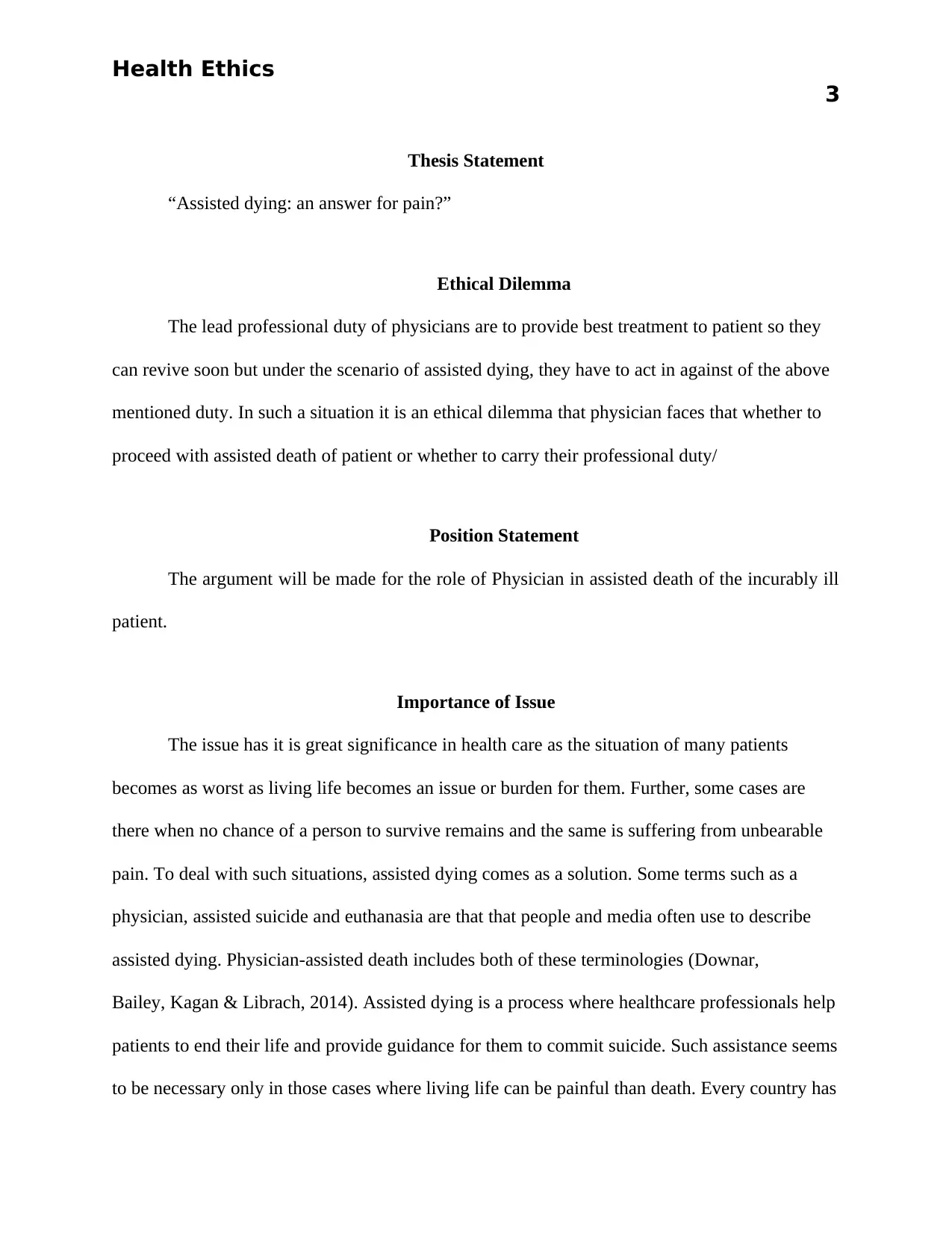
Health Ethics
3
Thesis Statement
“Assisted dying: an answer for pain?”
Ethical Dilemma
The lead professional duty of physicians are to provide best treatment to patient so they
can revive soon but under the scenario of assisted dying, they have to act in against of the above
mentioned duty. In such a situation it is an ethical dilemma that physician faces that whether to
proceed with assisted death of patient or whether to carry their professional duty/
Position Statement
The argument will be made for the role of Physician in assisted death of the incurably ill
patient.
Importance of Issue
The issue has it is great significance in health care as the situation of many patients
becomes as worst as living life becomes an issue or burden for them. Further, some cases are
there when no chance of a person to survive remains and the same is suffering from unbearable
pain. To deal with such situations, assisted dying comes as a solution. Some terms such as a
physician, assisted suicide and euthanasia are that that people and media often use to describe
assisted dying. Physician-assisted death includes both of these terminologies (Downar,
Bailey, Kagan & Librach, 2014). Assisted dying is a process where healthcare professionals help
patients to end their life and provide guidance for them to commit suicide. Such assistance seems
to be necessary only in those cases where living life can be painful than death. Every country has
3
Thesis Statement
“Assisted dying: an answer for pain?”
Ethical Dilemma
The lead professional duty of physicians are to provide best treatment to patient so they
can revive soon but under the scenario of assisted dying, they have to act in against of the above
mentioned duty. In such a situation it is an ethical dilemma that physician faces that whether to
proceed with assisted death of patient or whether to carry their professional duty/
Position Statement
The argument will be made for the role of Physician in assisted death of the incurably ill
patient.
Importance of Issue
The issue has it is great significance in health care as the situation of many patients
becomes as worst as living life becomes an issue or burden for them. Further, some cases are
there when no chance of a person to survive remains and the same is suffering from unbearable
pain. To deal with such situations, assisted dying comes as a solution. Some terms such as a
physician, assisted suicide and euthanasia are that that people and media often use to describe
assisted dying. Physician-assisted death includes both of these terminologies (Downar,
Bailey, Kagan & Librach, 2014). Assisted dying is a process where healthcare professionals help
patients to end their life and provide guidance for them to commit suicide. Such assistance seems
to be necessary only in those cases where living life can be painful than death. Every country has
⊘ This is a preview!⊘
Do you want full access?
Subscribe today to unlock all pages.

Trusted by 1+ million students worldwide
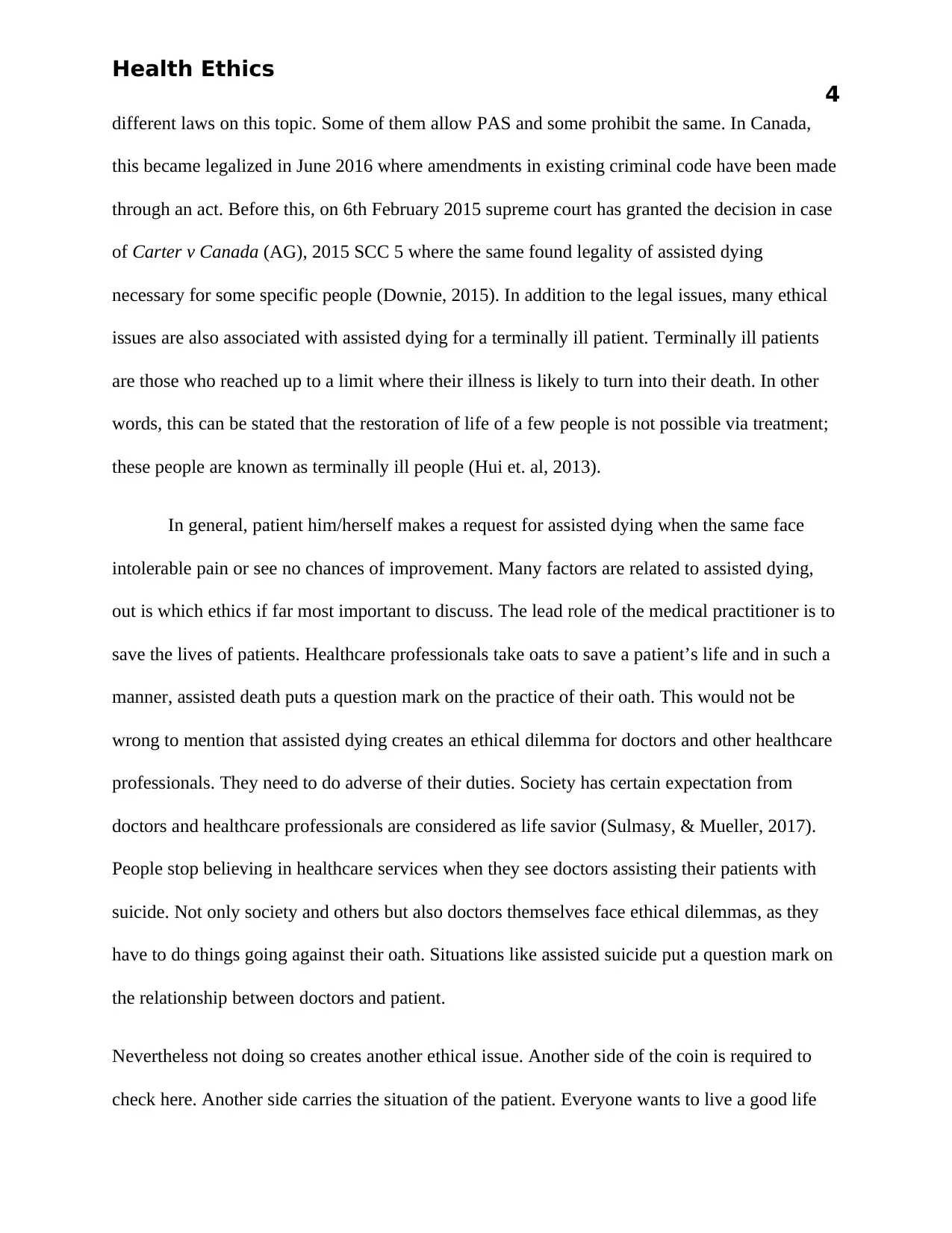
Health Ethics
4
different laws on this topic. Some of them allow PAS and some prohibit the same. In Canada,
this became legalized in June 2016 where amendments in existing criminal code have been made
through an act. Before this, on 6th February 2015 supreme court has granted the decision in case
of Carter v Canada (AG), 2015 SCC 5 where the same found legality of assisted dying
necessary for some specific people (Downie, 2015). In addition to the legal issues, many ethical
issues are also associated with assisted dying for a terminally ill patient. Terminally ill patients
are those who reached up to a limit where their illness is likely to turn into their death. In other
words, this can be stated that the restoration of life of a few people is not possible via treatment;
these people are known as terminally ill people (Hui et. al, 2013).
In general, patient him/herself makes a request for assisted dying when the same face
intolerable pain or see no chances of improvement. Many factors are related to assisted dying,
out is which ethics if far most important to discuss. The lead role of the medical practitioner is to
save the lives of patients. Healthcare professionals take oats to save a patient’s life and in such a
manner, assisted death puts a question mark on the practice of their oath. This would not be
wrong to mention that assisted dying creates an ethical dilemma for doctors and other healthcare
professionals. They need to do adverse of their duties. Society has certain expectation from
doctors and healthcare professionals are considered as life savior (Sulmasy, & Mueller, 2017).
People stop believing in healthcare services when they see doctors assisting their patients with
suicide. Not only society and others but also doctors themselves face ethical dilemmas, as they
have to do things going against their oath. Situations like assisted suicide put a question mark on
the relationship between doctors and patient.
Nevertheless not doing so creates another ethical issue. Another side of the coin is required to
check here. Another side carries the situation of the patient. Everyone wants to live a good life
4
different laws on this topic. Some of them allow PAS and some prohibit the same. In Canada,
this became legalized in June 2016 where amendments in existing criminal code have been made
through an act. Before this, on 6th February 2015 supreme court has granted the decision in case
of Carter v Canada (AG), 2015 SCC 5 where the same found legality of assisted dying
necessary for some specific people (Downie, 2015). In addition to the legal issues, many ethical
issues are also associated with assisted dying for a terminally ill patient. Terminally ill patients
are those who reached up to a limit where their illness is likely to turn into their death. In other
words, this can be stated that the restoration of life of a few people is not possible via treatment;
these people are known as terminally ill people (Hui et. al, 2013).
In general, patient him/herself makes a request for assisted dying when the same face
intolerable pain or see no chances of improvement. Many factors are related to assisted dying,
out is which ethics if far most important to discuss. The lead role of the medical practitioner is to
save the lives of patients. Healthcare professionals take oats to save a patient’s life and in such a
manner, assisted death puts a question mark on the practice of their oath. This would not be
wrong to mention that assisted dying creates an ethical dilemma for doctors and other healthcare
professionals. They need to do adverse of their duties. Society has certain expectation from
doctors and healthcare professionals are considered as life savior (Sulmasy, & Mueller, 2017).
People stop believing in healthcare services when they see doctors assisting their patients with
suicide. Not only society and others but also doctors themselves face ethical dilemmas, as they
have to do things going against their oath. Situations like assisted suicide put a question mark on
the relationship between doctors and patient.
Nevertheless not doing so creates another ethical issue. Another side of the coin is required to
check here. Another side carries the situation of the patient. Everyone wants to live a good life
Paraphrase This Document
Need a fresh take? Get an instant paraphrase of this document with our AI Paraphraser
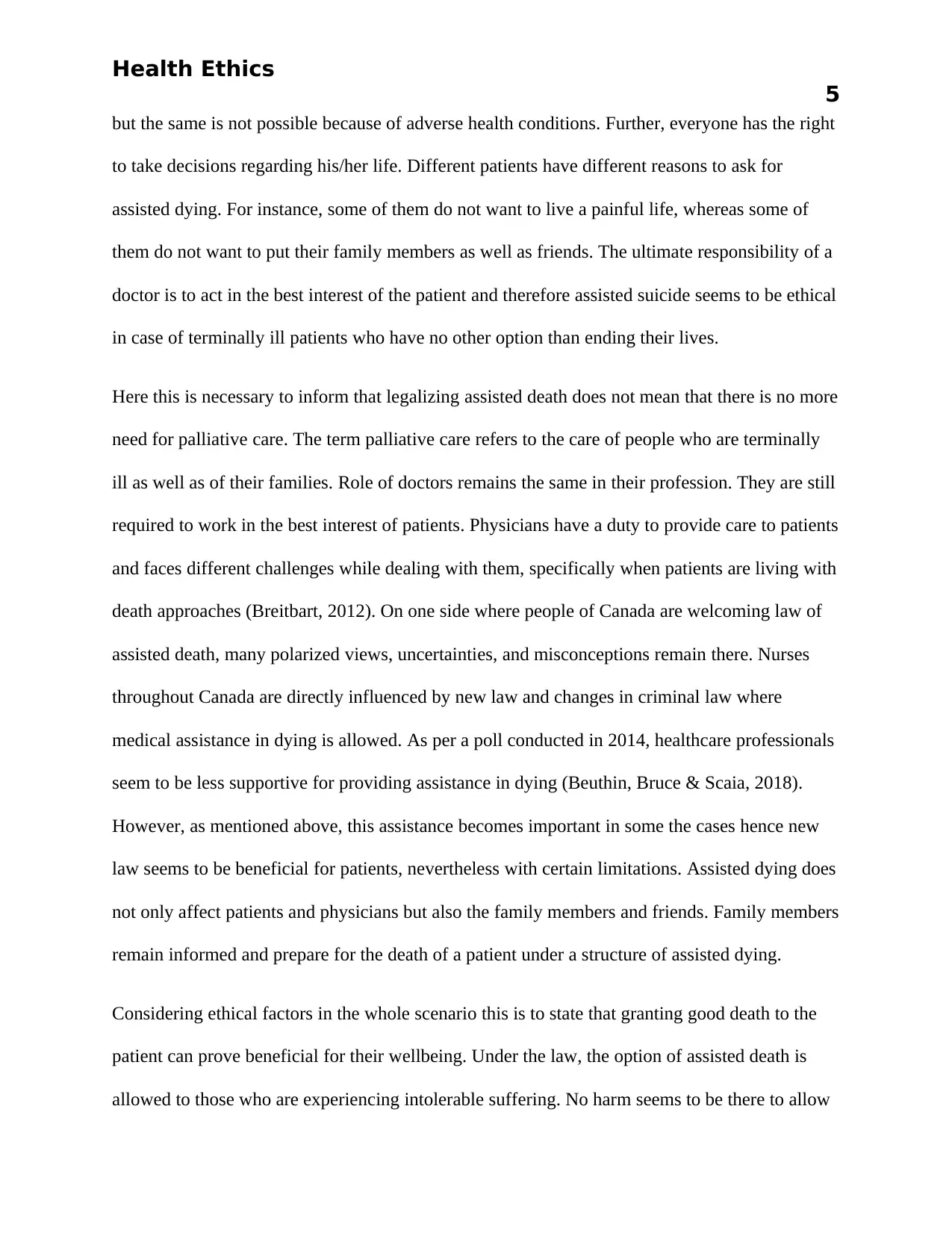
Health Ethics
5
but the same is not possible because of adverse health conditions. Further, everyone has the right
to take decisions regarding his/her life. Different patients have different reasons to ask for
assisted dying. For instance, some of them do not want to live a painful life, whereas some of
them do not want to put their family members as well as friends. The ultimate responsibility of a
doctor is to act in the best interest of the patient and therefore assisted suicide seems to be ethical
in case of terminally ill patients who have no other option than ending their lives.
Here this is necessary to inform that legalizing assisted death does not mean that there is no more
need for palliative care. The term palliative care refers to the care of people who are terminally
ill as well as of their families. Role of doctors remains the same in their profession. They are still
required to work in the best interest of patients. Physicians have a duty to provide care to patients
and faces different challenges while dealing with them, specifically when patients are living with
death approaches (Breitbart, 2012). On one side where people of Canada are welcoming law of
assisted death, many polarized views, uncertainties, and misconceptions remain there. Nurses
throughout Canada are directly influenced by new law and changes in criminal law where
medical assistance in dying is allowed. As per a poll conducted in 2014, healthcare professionals
seem to be less supportive for providing assistance in dying (Beuthin, Bruce & Scaia, 2018).
However, as mentioned above, this assistance becomes important in some the cases hence new
law seems to be beneficial for patients, nevertheless with certain limitations. Assisted dying does
not only affect patients and physicians but also the family members and friends. Family members
remain informed and prepare for the death of a patient under a structure of assisted dying.
Considering ethical factors in the whole scenario this is to state that granting good death to the
patient can prove beneficial for their wellbeing. Under the law, the option of assisted death is
allowed to those who are experiencing intolerable suffering. No harm seems to be there to allow
5
but the same is not possible because of adverse health conditions. Further, everyone has the right
to take decisions regarding his/her life. Different patients have different reasons to ask for
assisted dying. For instance, some of them do not want to live a painful life, whereas some of
them do not want to put their family members as well as friends. The ultimate responsibility of a
doctor is to act in the best interest of the patient and therefore assisted suicide seems to be ethical
in case of terminally ill patients who have no other option than ending their lives.
Here this is necessary to inform that legalizing assisted death does not mean that there is no more
need for palliative care. The term palliative care refers to the care of people who are terminally
ill as well as of their families. Role of doctors remains the same in their profession. They are still
required to work in the best interest of patients. Physicians have a duty to provide care to patients
and faces different challenges while dealing with them, specifically when patients are living with
death approaches (Breitbart, 2012). On one side where people of Canada are welcoming law of
assisted death, many polarized views, uncertainties, and misconceptions remain there. Nurses
throughout Canada are directly influenced by new law and changes in criminal law where
medical assistance in dying is allowed. As per a poll conducted in 2014, healthcare professionals
seem to be less supportive for providing assistance in dying (Beuthin, Bruce & Scaia, 2018).
However, as mentioned above, this assistance becomes important in some the cases hence new
law seems to be beneficial for patients, nevertheless with certain limitations. Assisted dying does
not only affect patients and physicians but also the family members and friends. Family members
remain informed and prepare for the death of a patient under a structure of assisted dying.
Considering ethical factors in the whole scenario this is to state that granting good death to the
patient can prove beneficial for their wellbeing. Under the law, the option of assisted death is
allowed to those who are experiencing intolerable suffering. No harm seems to be there to allow
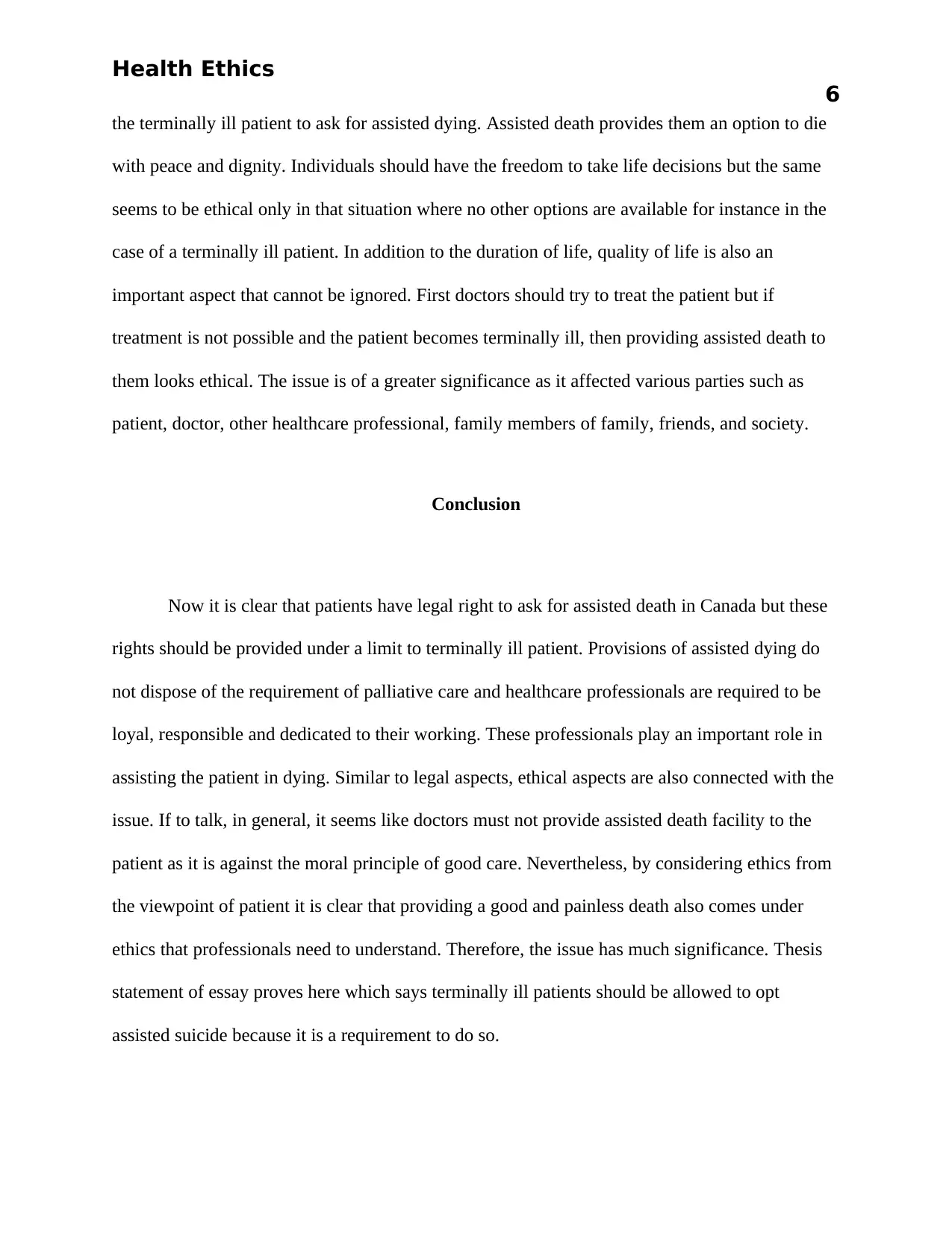
Health Ethics
6
the terminally ill patient to ask for assisted dying. Assisted death provides them an option to die
with peace and dignity. Individuals should have the freedom to take life decisions but the same
seems to be ethical only in that situation where no other options are available for instance in the
case of a terminally ill patient. In addition to the duration of life, quality of life is also an
important aspect that cannot be ignored. First doctors should try to treat the patient but if
treatment is not possible and the patient becomes terminally ill, then providing assisted death to
them looks ethical. The issue is of a greater significance as it affected various parties such as
patient, doctor, other healthcare professional, family members of family, friends, and society.
Conclusion
Now it is clear that patients have legal right to ask for assisted death in Canada but these
rights should be provided under a limit to terminally ill patient. Provisions of assisted dying do
not dispose of the requirement of palliative care and healthcare professionals are required to be
loyal, responsible and dedicated to their working. These professionals play an important role in
assisting the patient in dying. Similar to legal aspects, ethical aspects are also connected with the
issue. If to talk, in general, it seems like doctors must not provide assisted death facility to the
patient as it is against the moral principle of good care. Nevertheless, by considering ethics from
the viewpoint of patient it is clear that providing a good and painless death also comes under
ethics that professionals need to understand. Therefore, the issue has much significance. Thesis
statement of essay proves here which says terminally ill patients should be allowed to opt
assisted suicide because it is a requirement to do so.
6
the terminally ill patient to ask for assisted dying. Assisted death provides them an option to die
with peace and dignity. Individuals should have the freedom to take life decisions but the same
seems to be ethical only in that situation where no other options are available for instance in the
case of a terminally ill patient. In addition to the duration of life, quality of life is also an
important aspect that cannot be ignored. First doctors should try to treat the patient but if
treatment is not possible and the patient becomes terminally ill, then providing assisted death to
them looks ethical. The issue is of a greater significance as it affected various parties such as
patient, doctor, other healthcare professional, family members of family, friends, and society.
Conclusion
Now it is clear that patients have legal right to ask for assisted death in Canada but these
rights should be provided under a limit to terminally ill patient. Provisions of assisted dying do
not dispose of the requirement of palliative care and healthcare professionals are required to be
loyal, responsible and dedicated to their working. These professionals play an important role in
assisting the patient in dying. Similar to legal aspects, ethical aspects are also connected with the
issue. If to talk, in general, it seems like doctors must not provide assisted death facility to the
patient as it is against the moral principle of good care. Nevertheless, by considering ethics from
the viewpoint of patient it is clear that providing a good and painless death also comes under
ethics that professionals need to understand. Therefore, the issue has much significance. Thesis
statement of essay proves here which says terminally ill patients should be allowed to opt
assisted suicide because it is a requirement to do so.
⊘ This is a preview!⊘
Do you want full access?
Subscribe today to unlock all pages.

Trusted by 1+ million students worldwide
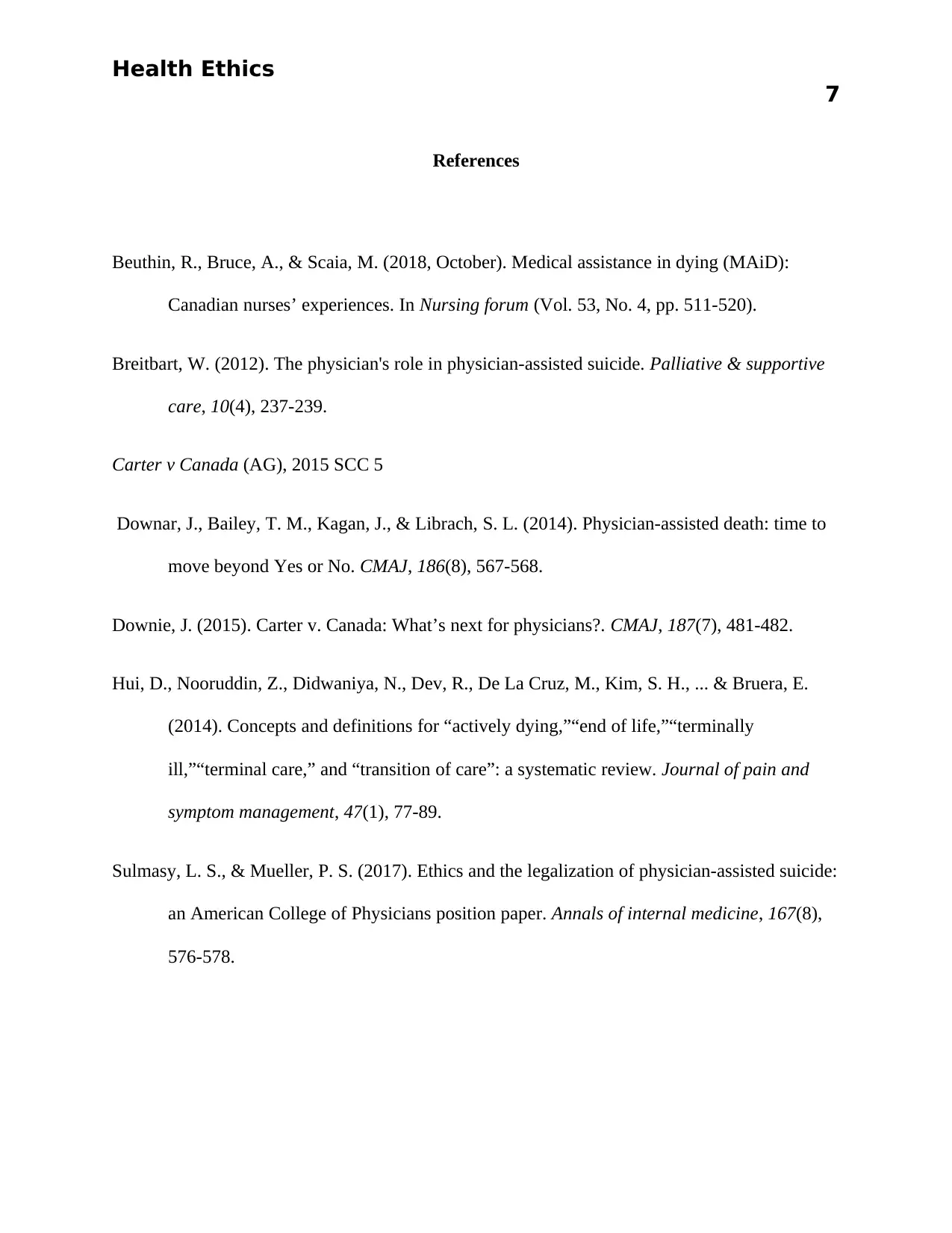
Health Ethics
7
References
Beuthin, R., Bruce, A., & Scaia, M. (2018, October). Medical assistance in dying (MAiD):
Canadian nurses’ experiences. In Nursing forum (Vol. 53, No. 4, pp. 511-520).
Breitbart, W. (2012). The physician's role in physician-assisted suicide. Palliative & supportive
care, 10(4), 237-239.
Carter v Canada (AG), 2015 SCC 5
Downar, J., Bailey, T. M., Kagan, J., & Librach, S. L. (2014). Physician-assisted death: time to
move beyond Yes or No. CMAJ, 186(8), 567-568.
Downie, J. (2015). Carter v. Canada: What’s next for physicians?. CMAJ, 187(7), 481-482.
Hui, D., Nooruddin, Z., Didwaniya, N., Dev, R., De La Cruz, M., Kim, S. H., ... & Bruera, E.
(2014). Concepts and definitions for “actively dying,”“end of life,”“terminally
ill,”“terminal care,” and “transition of care”: a systematic review. Journal of pain and
symptom management, 47(1), 77-89.
Sulmasy, L. S., & Mueller, P. S. (2017). Ethics and the legalization of physician-assisted suicide:
an American College of Physicians position paper. Annals of internal medicine, 167(8),
576-578.
7
References
Beuthin, R., Bruce, A., & Scaia, M. (2018, October). Medical assistance in dying (MAiD):
Canadian nurses’ experiences. In Nursing forum (Vol. 53, No. 4, pp. 511-520).
Breitbart, W. (2012). The physician's role in physician-assisted suicide. Palliative & supportive
care, 10(4), 237-239.
Carter v Canada (AG), 2015 SCC 5
Downar, J., Bailey, T. M., Kagan, J., & Librach, S. L. (2014). Physician-assisted death: time to
move beyond Yes or No. CMAJ, 186(8), 567-568.
Downie, J. (2015). Carter v. Canada: What’s next for physicians?. CMAJ, 187(7), 481-482.
Hui, D., Nooruddin, Z., Didwaniya, N., Dev, R., De La Cruz, M., Kim, S. H., ... & Bruera, E.
(2014). Concepts and definitions for “actively dying,”“end of life,”“terminally
ill,”“terminal care,” and “transition of care”: a systematic review. Journal of pain and
symptom management, 47(1), 77-89.
Sulmasy, L. S., & Mueller, P. S. (2017). Ethics and the legalization of physician-assisted suicide:
an American College of Physicians position paper. Annals of internal medicine, 167(8),
576-578.
1 out of 7
Related Documents
Your All-in-One AI-Powered Toolkit for Academic Success.
+13062052269
info@desklib.com
Available 24*7 on WhatsApp / Email
![[object Object]](/_next/static/media/star-bottom.7253800d.svg)
Unlock your academic potential
Copyright © 2020–2026 A2Z Services. All Rights Reserved. Developed and managed by ZUCOL.





